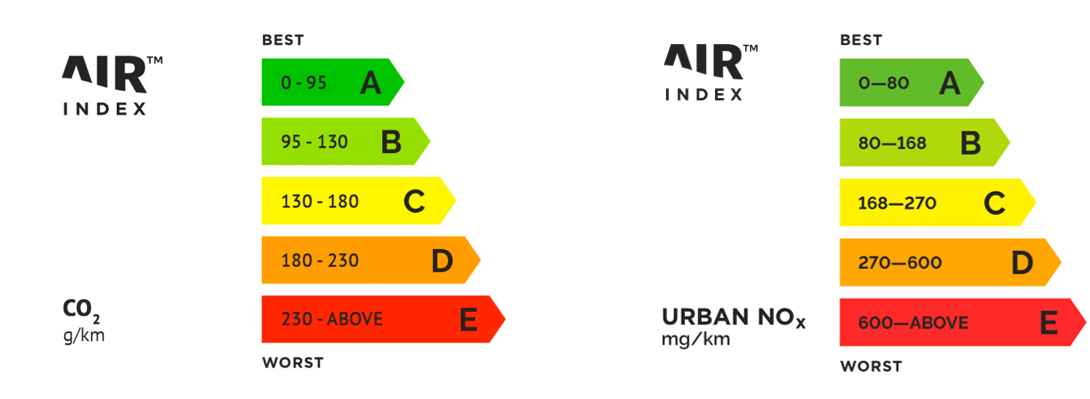Car insurance quote enquiries reveal real-world emissions dilemma for drivers: MoneySuperMarket research
14 October 2021: Despite the increasing popularity of greener vehicles, more than one in three (36%) cars in the UK fall into the worst two categories for harmful carbon dioxide (CO2) and nitrogen oxide (NOx) emissions, according to new research by leading price comparison site MoneySuperMarket.com.1,2
MoneySuperMarket’s latest study combines insurance enquiry volumes for car makes and models with data from the AIR Index, which ranks vehicles from A (most environmentally friendly) to E (least environmentally friendly).
Figures reveal that the most enquired about car in the UK, the 2008 Volkswagen Golf, is rated C for CO2 and D for NOx.1,2 The contribution of this model to road pollution may therefore be significant, due to its prevalence and low performing emissions scores.
Across the UK, Luton has the highest concentration of vehicles with the worst CO2 and NOx ratings, with over two-fifths (40.4%) of car insurance enquiries being for models in categories D or E. Following closely behind are Peterborough and Taunton, averaging 39.4% and 39.2% respectively.1,2
Despite a considerable number of cars with poor CO2 and NOx ratings on the roads, the environmental impact of vehicles is high on British motorists’ agendas. Two-thirds (66%) of car owners say they considered the environmental impact of their latest vehicle before purchasing it, with a third (33%) saying it was the primary consideration.3
With the 2030 ban on new petrol and diesel vehicles on the horizon, the data shows a shift in mindset, with over half (52%) now saying that the environmental impact of a vehicle would be the primary consideration when deciding which car to buy next.3
Nearly two-fifths (39%) say they are more likely to buy a hybrid car or electric car specifically due to the ban, while almost a third (28%) say it’s causing them to think more carefully about the harmful impact cars have on the environment.3
In total, two thirds (66%) of motorists in this survey worry about the impact their current car has on the environment. But it appears drivers are willing to put their money where their mouth is when it comes to going green, stating they would be prepared to spend £2,384 more on average for a vehicle that was better for the environment.3
Kate Devine, car insurance expert at MoneySuperMarket, commented: “With over one-third (36%) of cars in the UK having the poorest emissions ratings, it’s alarming to think of the environmental impact this might have. However, as a growing number of ‘green’ vehicles flood the market, it’s great to see MoneySuperMarket customers starting to opt for more environmentally friendly options.
“If environmental impact is a primary concern for you, there are an ever-increasing range of hybrid and electric vehicles which can help to reduce emissions on the roads. And whichever car you own or plan to buy, you should always compare the options for insurance to ensure you get the best deal for you.”
More information about insurance for electric cars, is available on the MoneySuperMarket website.
1 MoneySuperMarket car insurance enquiry data from 1st January 2021 to 26th September 2021
2 Data taken from airindex.com AIR Index
3 Consumer research conducted between 17th September 2021 and 21st September 2021
AIR Index emissions ratings explained:
CO2: Carbon dioxide (CO2) occurs naturally and should make up 0.04% of our air. However, the excess CO2 released by burning fossil fuels creates more CO2 than naturally intended. CO2 is a greenhouse gas. It absorbs heat and releases it slowly, so this excess build-up of CO2 in the atmosphere is gradually heating the earth.
Excess levels of CO2 can be harmful to humans and the environment. High levels of CO2 contribute to air pollution and the greenhouse effect.
According to the SMMT New Car CO2 Report 2019, the average new car CO2 emissions are 124.5g/km in the UK.
NOx: NOx refers to both nitric oxide (NO) and nitrogen dioxide (NO2). These gases are released from vehicle engines and in cities and urban areas can reach harmful levels. They are an irritant and can cause inflammation of the airways.
NOx is produced by combustion. This can be caused by engines, gas boilers, energy production and more. However, in urban areas where we see the highest levels of NOx, vehicle engines and traffic emissions are the main cause.
The most effective way to reduce urban NOx emissions is to choose and use vehicles with the best AIR Index ratings, where ‘A’ is the cleanest. In fact, ‘E’ rated vehicles can produce more than 20 times the level of NOx emissions than an ‘A’ rated vehicle and so your vehicle choice will make a real and lasting difference to the quality of air that we breathe.
The AIR Index ratings for urban CO2 and NOx are rated as follows:
